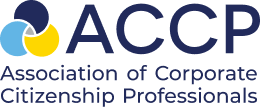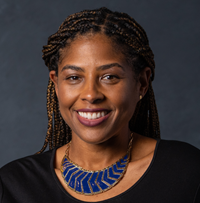ACCP Staff
This month, we’re excited to feature Binta Beard, Head of US Social Impact and President of the Novartis US Foundation.
Binta shares how her journey—from public health research to Capitol Hill to leading global philanthropy—shaped her perspective on corporate social impact.
She also reminds us that success in this field requires curiosity, business acumen, and the ability to communicate across diverse stakeholders—skills that will help CSR professionals stay ahead in an ever-changing landscape.
How did you get your start in corporate citizenship?
Notes of corporate citizenship are present throughout my career journey. With a master’s and doctorate in public health my research weighed the role social factors play in shaping our health, which involved consideration of the private sector to inform solutions.
I worked in the US House and Senate for five years, drafting policies and meeting with corporations on an array of issues, including corporate citizenship. And as a consultant with multinational companies my portfolio included corporate responsibility programs.
I truly immersed myself in this rewarding work when I took on a role leading global philanthropy at AbbVie. In this capacity, I oversaw AbbVie’s Foundation and corporate philanthropy and, with the amazing team there, led an evolution leveraging philanthropy to drive change with communities.
The field is evolving rapidly. What are the most important skills and knowledge corporate social impact professionals need to stay ahead of the curve and be successful in the future?
- Business Acumen: Understanding business dynamics and priorities is critical. Embedding this understanding in corporate citizenship strategies and communications maximizes our impact and reinforces the resilience of our programs.
- Be Forever Curious: Seek knowledge and make correlations across an array of sources including within our sector, but also policy, foreign affairs, economics, health, social sciences, etc. A diverse breadth of knowledge helps you pull insights and make connections across different fields that can be transformative, differentiating and provide indications of what is around the bend.
On that note, staying ahead of the curve and being successful in the future means making sure you proactively seek relationships and conversations with people outside your corporate function and your field. You don’t know what you don’t know. Still, each of us is likely one degree of separation away from someone who could catalyze our understanding of AI, product pipelines, stakeholder expectations, geopolitics, and other issues that will shape our work in the near and long term. - Communicating to Diverse Stakeholders: In our field, we have to meet our stakeholders where they are, and part of that means both understanding the priorities of internal/external stakeholders and successfully modulating our communication to ensure it is clear and resonates with what matters to them.
What advice or lesson learned do you most often share with members of your team or other CSR professionals?
This is a hard one; I often reference many lessons and advice to guide me and others. But I would say, when I was staffing a US Senator, I would get asked high-stakes questions, and I learned the importance of saying 1) I don’t know and 2) But I will get the answer to you ASAP.
Trust and integrity in your word are fundamental; if you don’t know the answer, don’t say something inaccurate, but you must promptly get the correct answer.
Also, it is essential to surround yourself with colleagues who push and challenge you. My ideal team has people with expertise beyond and complementary to mine. Avoid group think and foster a space where the team collectively asks each other questions to integrate alternative approaches and consider what we may be missing to drive to the successful achievement of goals.
What is one specific piece of advice you received that has served you well in your professional journey?
Don’t get caught up in hierarchies and be kind. Often overlooked and undertreated, people have immense power; they could eventually be your peer, boss, or person you’re asking for funding or support from one day.
One of my most transformative career opportunities came from a former direct report suggesting me for the role. Separately, at one point, as a new hire, the wonderful administrative assistant took me to the side to give me golden advice. Be kind and see the power and potential in people.
One fun/personal question – who’s someone you admire and why?
I honestly can’t select one specific person that I admire. The world, my community, and my family are filled with people who fill me with admiration literally every day and inspire me to be better and do more. Admiration flows from the quiet resilience, kindness, and steadfastness of everyday acts, but it also figures in big and small driving changes on global stages. It’s kind of incredible that we can experience admiration every day.

